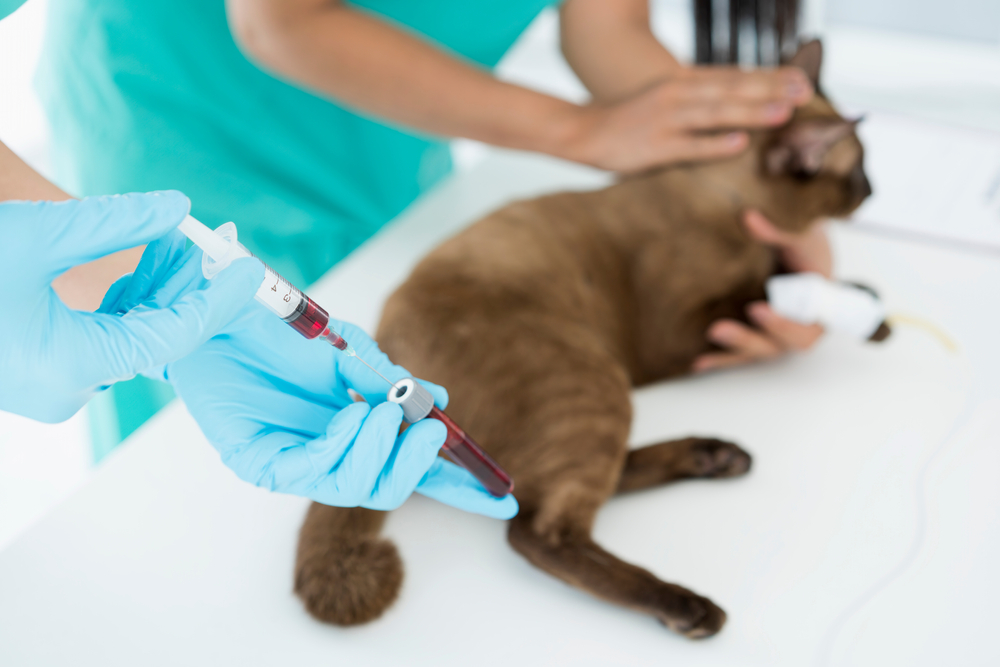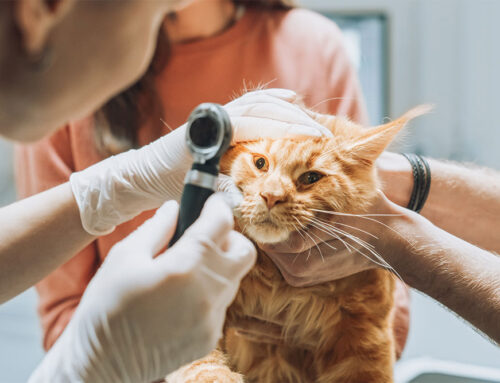We may be biased, but we believe senior pets are the best. Their muzzle may have turned grey and their body lost its graceful agility, but the pet-pet owner bond is never stronger or closer than during a pet’s golden years.
Protecting that special relationship is at the heart of everything we do at Livingston Veterinary Hospital. And, key to that protection is increasing your senior pet’s routine wellness visits (i.e., from yearly to twice yearly) and annual blood work. By paying closer attention to your aging pet’s health, we can identify and intercept abnormal changes and prevent unnecessary illness, pain, and decline.
Here are four reasons why we recommend blood work for senior pets at least annually.
#1: Senior pet health changes rapidly
It’s no secret that pets age faster than humans—but, while it’s easy to appreciate external changes such as increased stiffness, cloudy eyes, and a shuffling gait, internal abnormalities can be harder—if not impossible—to recognize. Unfortunately, if these hidden changes accumulate unseen, your pet’s body becomes more vulnerable to rapid and severe decline. When your senior pet’s blood is tested annually—or more frequently if your pet has known health issues—we can expose these hidden abnormalities that may include decreased kidney function, elevated liver enzymes, or low red blood cells, and pursue diagnosis and treatment.
#2: Early disease detection in pets allows for simpler treatment
Disease that is identified in its earliest stages is often more manageable, and treatment may be curative. Also, treatment is commonly less invasive—a great advantage for senior pets who may experience increased anxiety and slower recovery times—and may be less expensive.
Consider routine blood work an investment in your pet’s health. For a small cost, you’ll receive priceless information (i.e., results) that could add years to your pet’s life and help you avoid costly and extensive treatment, or the heartbreak of a poor prognosis.
#3: Early diagnosis often ensures a better outcome and extends a pet’s life-span
Most senior pet conditions are chronic and progressive, meaning they cannot be cured, but their effects can be managed or minimized with proper care. While learning that your pet’s blood work shows kidney disease, liver damage, cancer, or an endocrine abnormality can be devastating, early diagnosis provides the priceless advantage of extra time.
With proactive treatment and regular monitoring, many pets live comfortably for years—rather than weeks or months.
#4: Knowing what to expect can help you plan your pet’s care
Of course, test results aren’t always what we hope for or expect. But, if your pet’s routine blood work shows a grave prognosis, there is still a silver lining. Knowing your pet’s prognosis allows us to begin palliative care, show you what to watch for, and how to care for your pet at home— keeping your pet pain-free and comfortable for as long as possible.
No one wants to receive bad news, but increased awareness can help you make the most of the time you have left with your pet, and ensure they live their best life every single day.
Understanding the pet blood work panel
Now that you know why your senior pet needs routine blood work, let’s take a closer look at what’s included as part of our standard testing for healthy senior pets.
- The complete blood count (CBC) — The CBC measures the cellular portion of your pet’s blood, and includes several significant CBC values:
- Red blood cells — Red blood cells (RBCs) transport oxygen throughout the body in exchange for carbon dioxide. Changes in your pet’s red blood cell volume, size, or shape may indicate bleeding, dehydration, anemia, changes in blood cell production, or destruction.
- White blood cells — White blood cells (WBCs) are a major part of the senior pet immune system. Low WBCs can signal compromised immunity, while high numbers indicate infection or cancers such as lymphoma.
- Platelets — Platelets are small fibrous components that are dispatched to repair blood vessel leaks. Inadequate platelets can suggest an immune-mediated disease or hidden internal bleeding.
- Hemoglobin — Hemoglobin binds oxygen to red blood cells. Low hemoglobin can occur during anemia or hemorrhage.
- General chemistry — The general chemistry or “chem” measures organ function and electrolytes, which are critical components of senior pet health. The general chemistry is an extensive panel with many values that influence and affect one another, so relying on your Livingston Veterinary Hospital veterinarian for a complete interpretation is important.
- Kidney values — By measuring the kidney’s ability to filter toxins and concentrate urine, your senior pet’s veterinarian can identify kidney insufficiency and failure.
- Liver values — Age-related liver changes are common, but some can cause rapid decline and illness. Measuring liver-specific enzymes and bile acids can aid in determining organ health.
- Pancreatic values — The pancreas is key for digesting and absorbing nutrition, but can easily become inflamed or impacted by medication use, kidney disease, and other disorders.
- Electrolytes — Electrolytes maintain precise pH balance and homeostasis of the pet’s internal environment. Abnormality can occur during acute illness or kidney disease.
- Additional testing — Depending on your senior pet’s health status, additional screening tests may be recommended, including:
-
- Urinalysis
- Thyroid test
- Imaging (e.g., ultrasound, X-rays)
Go deeper with senior pet blood work

Your senior pet is as close to you as your own shadow. Understanding their health from the inside out with routine blood work can help ensure that bond continues for many years to come. For all your senior pet questions and care, contact Livingston Veterinary Hospital.







Leave A Comment